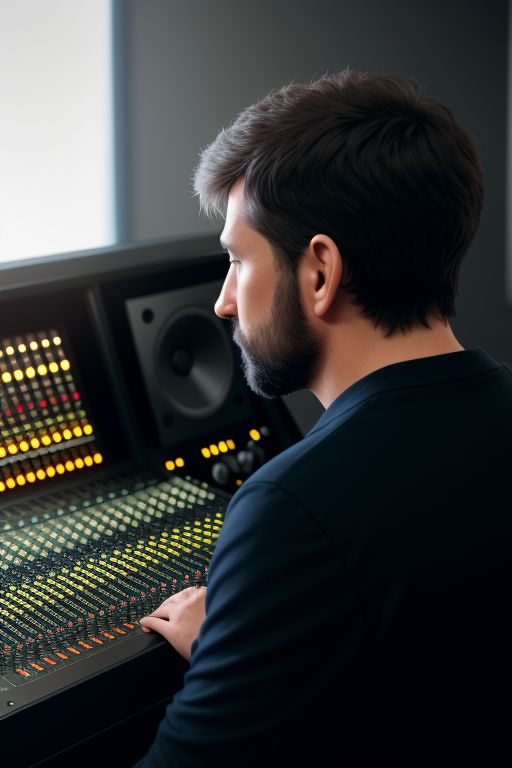The role of a Sound Mixer or Sound Engineer is crucial to the overall quality and impact of the audio. These professionals are responsible for capturing, mixing, and editing sound to ensure that the audio is clear, balanced, and enhances the viewer’s experience. This article delves into the diverse responsibilities of a Sound Mixer/Engineer, highlighting their significance, required skills, and the impact they have on the overall production.
The Role of a Sound Mixer/Engineer in Broadcast
The Sound Mixer/Engineer is responsible for all aspects of audio during a production. They work closely with directors, producers, and other crew members to ensure that the audio quality meets the highest standards. Here’s a detailed look at their key responsibilities:
- Pre-Production Planning
- Script Analysis: The Sound Mixer/Engineer reviews the script to identify any specific audio requirements, such as special effects, ambient sounds, or musical cues.
- Equipment Preparation: They prepare and test all necessary audio equipment, including microphones, mixers, recorders, and cables. They ensure that everything is in working order and ready for the shoot.
- Location Scouting: They may visit shooting locations to assess the acoustics and identify potential challenges, such as background noise or echo. This helps in planning how to capture the best possible audio.
- Technical Setup
- Microphone Placement: The Sound Mixer/Engineer strategically places microphones to capture clear and balanced audio. This includes using boom mics, lavalier mics, and shotgun mics as needed.
- Sound Check: They conduct sound checks to ensure that all microphones and recording equipment are working correctly. They adjust levels and settings to achieve optimal audio quality.
- Soundproofing: If necessary, they implement soundproofing measures to minimize unwanted noise and ensure that the recording environment is as controlled as possible.
- Production Execution
- Live Mixing: During production, the Sound Mixer/Engineer manages the live audio mix, adjusting levels in real-time to ensure clarity and balance. They monitor the audio feed and make necessary adjustments on the fly.
- Recording: They oversee the recording of all audio elements, including dialogue, sound effects, and ambient sounds. They ensure that all audio is captured at the highest quality.
- Communication: The Sound Mixer/Engineer communicates with the director and other crew members to ensure that the audio aligns with the creative vision and technical requirements of the production.
- Post-Production Editing
- Audio Editing: After filming, the Sound Mixer/Engineer edits the recorded audio to remove any unwanted noise, balance levels, and enhance the overall sound quality. This involves using audio editing software to fine-tune the audio tracks.
- Sound Effects and Music: They add sound effects and music to enhance the production. This includes layering in background music, adding Foley sounds, and integrating any other audio elements required by the script.
- Final Mix: The Sound Mixer/Engineer creates the final audio mix, ensuring that all elements are balanced and cohesive. They review the mix with the director and producers to make any final adjustments before the broadcast.
Key Skills Required for a Sound Mixer/Engineer
Being an effective Sound Mixer/Engineer requires a combination of technical knowledge, creative skills, and attention to detail. Here are some of the most critical skills needed:
- Technical Proficiency: Sound Mixers/Engineers must have a deep understanding of audio equipment and software, including microphones, mixers, recorders, and editing tools.
- Critical Listening: The ability to listen critically and identify issues with audio quality is essential. This includes detecting unwanted noise, balancing levels, and ensuring clarity.
- Creativity: A creative approach to sound design is important for enhancing the narrative and emotional impact of the production.
- Problem-Solving: The ability to troubleshoot and resolve technical issues quickly is vital, especially during live broadcasts or tight production schedules.
- Attention to Detail: Precision and attention to detail are essential to ensure that all audio elements are captured and mixed correctly.
The Impact of a Sound Mixer/Engineer
The Sound Mixer/Engineer’s role is central to the overall quality and effectiveness of a broadcast. Their work directly influences the viewer’s experience and the emotional impact of the production. Here are some ways Sound Mixers/Engineers make a significant impact:
- Audio Quality: By ensuring high-quality audio, Sound Mixers/Engineers enhance the overall production value, making it more engaging and professional.
- Clarity and Balance: They ensure that dialogue is clear and intelligible, sound effects are realistic, and music is balanced, contributing to a cohesive and immersive experience.
- Emotional Impact: Through sound design, they help create the mood and atmosphere of the production, reinforcing the narrative and emotional tone.
- Technical Reliability: They maintain and troubleshoot audio equipment, ensuring that all audio is captured and mixed without technical issues, which is crucial for live broadcasts.
The Sound Mixer/Engineer’s Workflow in Broadcast Production
To understand the role of a Sound Mixer/Engineer, it’s essential to look at their workflow in detail, from pre-production to post-production.
- Pre-Production Phase
- Script Review: The Sound Mixer/Engineer reviews the script to identify audio needs and plan for any special requirements.
- Equipment Check: They prepare and test all audio equipment, ensuring it is in working order and ready for transport.
- Location Assessment: They assess shooting locations to plan for optimal microphone placement and address any potential acoustic challenges.
- Production Phase
- Microphone Setup: The Sound Mixer/Engineer sets up microphones and other audio equipment according to the needs of the scene. This includes placing lavalier mics on actors, positioning boom mics, and setting up ambient mics.
- Sound Check: They conduct thorough sound checks to ensure that all equipment is functioning correctly and that levels are properly set.
- Live Mixing and Recording: During production, the Sound Mixer/Engineer monitors and adjusts audio levels in real-time, ensuring that all audio is clear and balanced. They oversee the recording of all audio elements.
- Post-Production Phase
- Audio Editing: The Sound Mixer/Engineer edits the recorded audio to remove noise, balance levels, and enhance clarity. They use audio editing software to fine-tune the sound.
- Sound Design: They add sound effects, music, and other audio elements to enhance the production. This includes layering in background music and integrating Foley sounds.
- Final Mix: They create the final audio mix, ensuring that all elements are balanced and cohesive. They review the mix with the director and producers for final approval.
The Evolution of the Sound Mixer/Engineer’s Role
The role of the Sound Mixer/Engineer has evolved significantly with advancements in technology and changes in production methods. Today’s Sound Mixers/Engineers must stay updated with the latest tools and techniques in the industry:
- Digital Audio Workstations (DAWs): The use of DAWs has transformed the way audio is edited and mixed, allowing for more precise control and manipulation of sound.
- Wireless Technology: Advances in wireless microphone technology have improved the flexibility and reliability of capturing audio on set.
- Surround Sound and Immersive Audio: The rise of surround sound and immersive audio formats, such as Dolby Atmos, has expanded the capabilities and creative possibilities for Sound Mixers/Engineers.
- Remote Production: The ability to conduct remote production and editing has become increasingly important, especially during situations where on-site work is limited.
Real-World Examples of Sound Mixers/Engineers
To illustrate the impact and responsibilities of Sound Mixers/Engineers, let’s look at some real-world examples:
- Live Sports Broadcasting
- Sound Mixer/Engineer’s Role: In live sports broadcasting, the Sound Mixer/Engineer is responsible for capturing the ambient sounds of the stadium, the commentary, and any on-field interviews. They ensure that all audio elements are balanced and clear.
- Challenges: Live sports require real-time adjustments and quick problem-solving to handle unpredictable events and maintain audio quality.
- Film Production
- Sound Mixer/Engineer’s Role: In film production, the Sound Mixer/Engineer captures dialogue, sound effects, and ambient sounds on set. They work closely with the director to ensure that the audio supports the narrative and emotional tone of the film.
- Challenges: Film production often involves complex sound design and precise synchronization of audio with visual elements. The Sound Mixer/Engineer must ensure that all audio is captured and mixed to enhance the storytelling.
- Television News
- Sound Mixer/Engineer’s Role: In television news, the Sound Mixer/Engineer manages the audio for live broadcasts, ensuring that reporters, anchors, and interviewees are heard clearly. They balance levels and handle any technical issues that arise.
- Challenges: News broadcasting requires quick adjustments and the ability to handle live audio in dynamic and often unpredictable environments.
Conclusion
The role of a Sound Mixer/Engineer in broadcast is multifaceted and essential to the success of any production. Sound Mixers/Engineers are the audio experts who ensure that all sound elements are captured, mixed, and edited to the highest standards. Their responsibilities span technical, creative, and problem-solving tasks, requiring a unique blend of skills and expertise.
Sound Mixers/Engineers play a crucial role in ensuring high-quality audio content, contributing significantly to the overall impact and success of the broadcast. Their work enhances the narrative, engages the audience, and ensures that the production runs smoothly and efficiently.






Leave a Reply